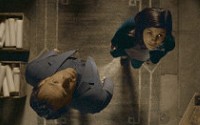
scr Akiva Goldsman
with Tom Hanks, Audrey Tautou, Ian McKellen, Paul Bettany, Jean Reno, Alfred Molina, J¸rgen Prochnow, Etienne Chicot, Jean-Yves Berteloot, Jean-Pierre Marielle, Marie-FranÁoise Audollent, Daisy Doidge-Hill
release US/UK 19.May.06
06/US Columbia 2h29

Spot the clues: DaVinci's Last Supper; Hanks and Tatou




See also:
ANGELS & DEMONS (2009)
INFERNO (2016)
 In adapting Dan Brown's contentious mega-selling potboiler, the filmmakers wisely keep the novel's tone intact. This is a gripping adventure with an outrageous premise that seems oddly believable, even though it's pure fiction.
In adapting Dan Brown's contentious mega-selling potboiler, the filmmakers wisely keep the novel's tone intact. This is a gripping adventure with an outrageous premise that seems oddly believable, even though it's pure fiction.
Professor Robert Langdon (Hanks) is lecturing in Paris when he becomes the prime suspect in a murder case. The forensics expert Sophie (Tatou) helps him escape--she's personally linked to the case--and the pair set off to find out what really happened. This involves following a series of coded riddles laid out by the victim, while a fervent monk hitman (Bettany) and a tenacious French cop (Reno) are on their trail. They seek refuge with a sardonic old Brit (McKellen) who may be able to unlock the secret, which could shake Christianity to its roots.
This isn't filmed like a normal Euro-thriller; Salvatore Totino's cinematography is lush, velvety and dark, establishing a sinister, creepy vibe that draws us in as a flurry of confusing action set-pieces set things off. It's not until McKellen enters at the one-hour mark that the film shifts into full-speed. He adds a badly needed spark of personality and wit, and also explains the entire plot for us, to set the ball rolling toward the big climax, which is nicely understated and beautifully played by Tatou.
As with their previous collaborations (A Beautiful Mind, Cinderella Man), Howard and Goldsman avoid all subtlety to make sure we get what's happening here. If the dialog and images aren't obvious enough, they're ready with an elaborately staged flashback (childhoods? the crusades? an 18th century London streetscape? check!). Or perhaps a glowy halo around a key item will help us spot it better. It's artfully done, but without any real character development, the film never quite grabs us.
At least the theological controversy doesn't swamp the fun. The filmmakers cleverly diffuse it with "what if" dialog that questions the theories in lively on-screen debates. In the end, it's clearly just a big-budget detective movie, complete with car chases, shifty characters, massive secrets and rather a lot of gruesome killing. It's thoroughly entertaining, albeit dense and over-serious. But what makes it unmissable is how it gives us something to talk about for months afterwards.
 |
themes, violence, grisliness | 16.May.06 |

 Donna R Carter, Wisconsin: "Does not work to full potential. Not a bad movie, I thought, but for all it was purported to be, and all the controversy it was supposed to raise, well, it didn't smack me upside the head with it like I wanted it to. I wanted to be enthralled, intrigued. But I always felt like I was just observing, and it didn't really grab me enough to make it matter. The soundtrack could have helped the story along if it hadn't been so forgettable. I don't even vaguely remember hearing it. I was entertained, but I guess I hoped for something deeper than strictly superficial entertainment. It seemed much more just a fictional story than something that made me wonder, 'What if it actually could be true?' Not having read the book, I can't comment on whether characters were miscast. They seemed alright to me." (21.Aug.06)
Donna R Carter, Wisconsin: "Does not work to full potential. Not a bad movie, I thought, but for all it was purported to be, and all the controversy it was supposed to raise, well, it didn't smack me upside the head with it like I wanted it to. I wanted to be enthralled, intrigued. But I always felt like I was just observing, and it didn't really grab me enough to make it matter. The soundtrack could have helped the story along if it hadn't been so forgettable. I don't even vaguely remember hearing it. I was entertained, but I guess I hoped for something deeper than strictly superficial entertainment. It seemed much more just a fictional story than something that made me wonder, 'What if it actually could be true?' Not having read the book, I can't comment on whether characters were miscast. They seemed alright to me." (21.Aug.06)
HOME | REVIEWS | NEWS | FESTIVAL | AWARDS | Q&A | ABOUT | TALKBACK